The Colonial living room is a hallmark of sophistication and timeless design, blending historic influences with modern sensibilities.
Rooted in 17th and 18th-century aesthetics, this style offers an array of possibilities, from rustic charm to modern Colonial decor.
Whether you’re redesigning a cozy space or revamping a grand living room, these ideas will guide you in creating a space that embodies elegance and functionality.
What is Colonial Style in Living Rooms?
The Colonial style is deeply rooted in history, marked by its symmetry, balance, and practicality.
Originally developed in the Americas during colonial times, it draws from European influences, particularly English, Dutch, and French.
This style incorporates neutral color palettes, sturdy craftsmanship, and a focus on comfort.
Key Characteristics of Colonial Living Rooms
- Neutral Color Palette: Think whites, creams, beiges, and muted earth tones.
- Furniture: Heavy, well-crafted pieces such as wingback chairs, wooden chests, and tufted sofas.
- Textures: Rich woods like mahogany, oak, or walnut, complemented by velvet, linen, or wool upholstery.
- Natural Materials: Incorporating stone, reclaimed wood, and greenery for authenticity.
- Symmetry: Furniture and decor are arranged in balanced, harmonious layouts.
This style’s versatility allows for endless interpretations, from Victorian opulence to minimalist Colonial charm, ensuring it remains relevant in modern homes.
1. Traditional Colonial Elegance
Nothing speaks to timeless design like a traditional Colonial living room. This style emphasizes grandeur through thoughtful details and classic furniture arrangements.
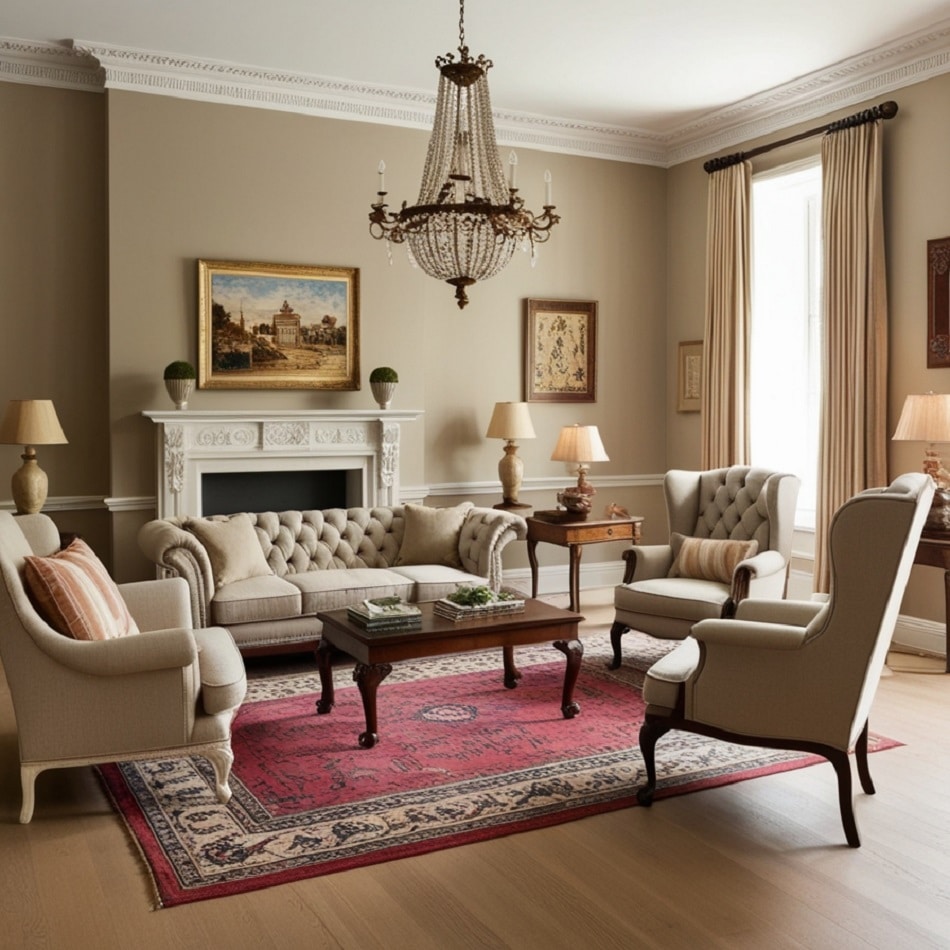
How to Achieve the Look
- Furniture: Opt for tufted sofas, claw-foot tables, and high-backed wing chairs.
- Colors: Stick to a neutral base, enhancing the space with deep wood tones and subtle accents.
- Decor: Add ornate crown molding, Persian-style rugs, and vintage artwork.
Quick Tip: Use matching side tables and lamps on either side of a sofa to maintain symmetry.
Why It Works
The balance between elegance and comfort ensures the space feels refined yet inviting, making it perfect for both everyday use and entertaining guests.
2. Colonial Farmhouse Charm
For those drawn to rustic charm, the Colonial farmhouse aesthetic marries the coziness of country living with the refinement of Colonial design.
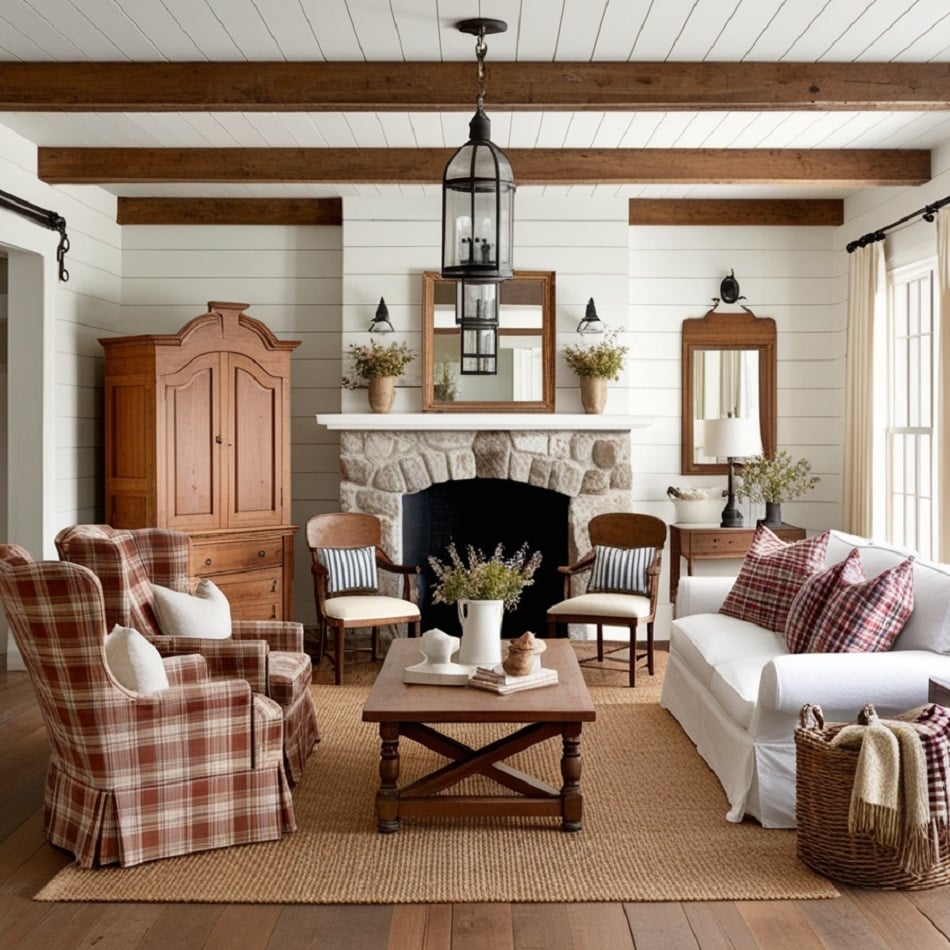
Design Features
- Architectural Elements: Exposed wooden beams, whitewashed shiplap walls, and rustic stone fireplaces.
- Furniture: Farmhouse-style dining tables, vintage armoires, and cozy plaid-covered armchairs.
- Lighting: Mason jar pendants, wrought iron chandeliers, or lantern-style wall sconces.
Styling Tips
- Use vintage or distressed furniture to enhance the lived-in feel.
- Incorporate natural fiber rugs and soft textiles like knitted throws and gingham pillows.
- Add small decor pieces like mason jar vases filled with wildflowers for a homely touch.
Why You’ll Love It: This style is effortlessly warm and inviting, making it ideal for family-oriented spaces.
3. Urban Colonial Style
Urban Colonial blends the charm of Colonial decor with a sleek, modern urban aesthetic.
This style is ideal for those living in apartments or lofts who want to maintain a balance between historical inspiration and contemporary design.
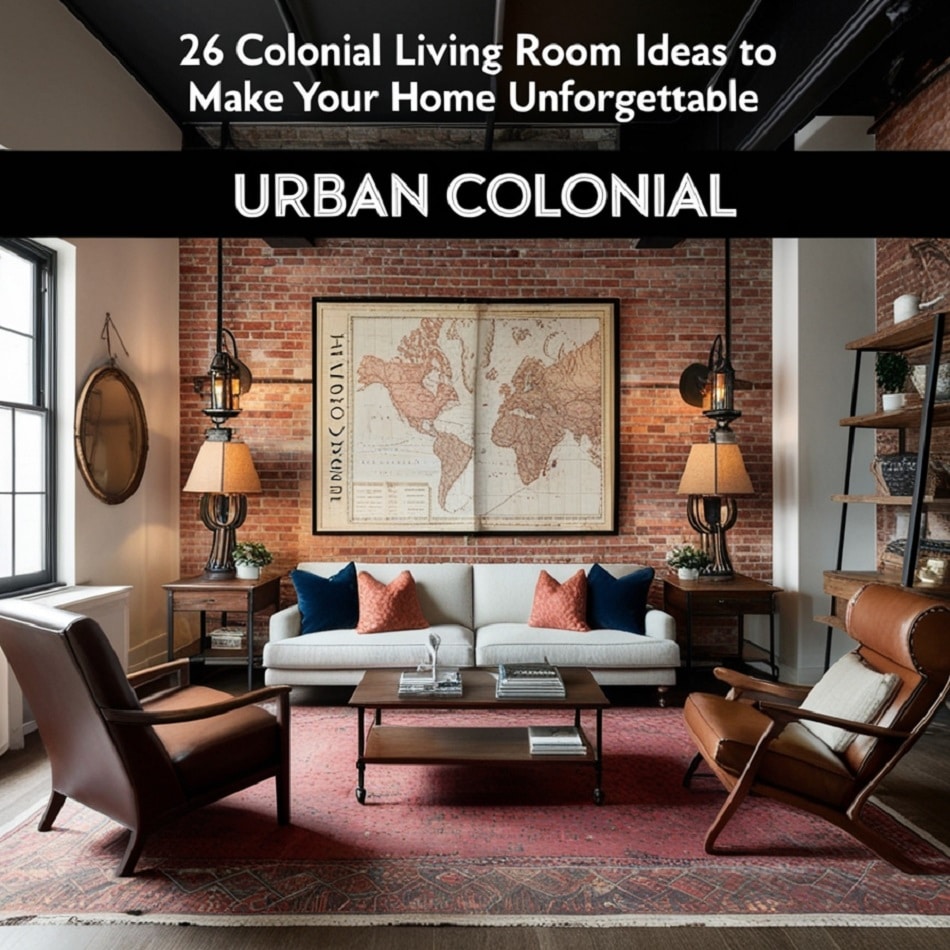
Key Elements
- Architectural Details: Exposed brick walls, high ceilings, and metal fixtures.
- Furniture: Pair sleek leather armchairs with mid-century modern sofas for a striking contrast.
- Decor: Incorporate vintage maps, industrial-style lighting, and reclaimed wood shelving.
Pro Tip: Use large mirrors with antique frames to reflect light and add depth to smaller spaces.
This fusion of old and new creates a bold yet livable environment, perfect for city dwellers looking to add a touch of history to their homes.
4. Modern Minimalist Colonial
This style strips Colonial design down to its essentials, focusing on simplicity and functionality while retaining its signature elegance.
Minimalism complements the structured nature of Colonial interiors, offering a refreshing take on this historic style.
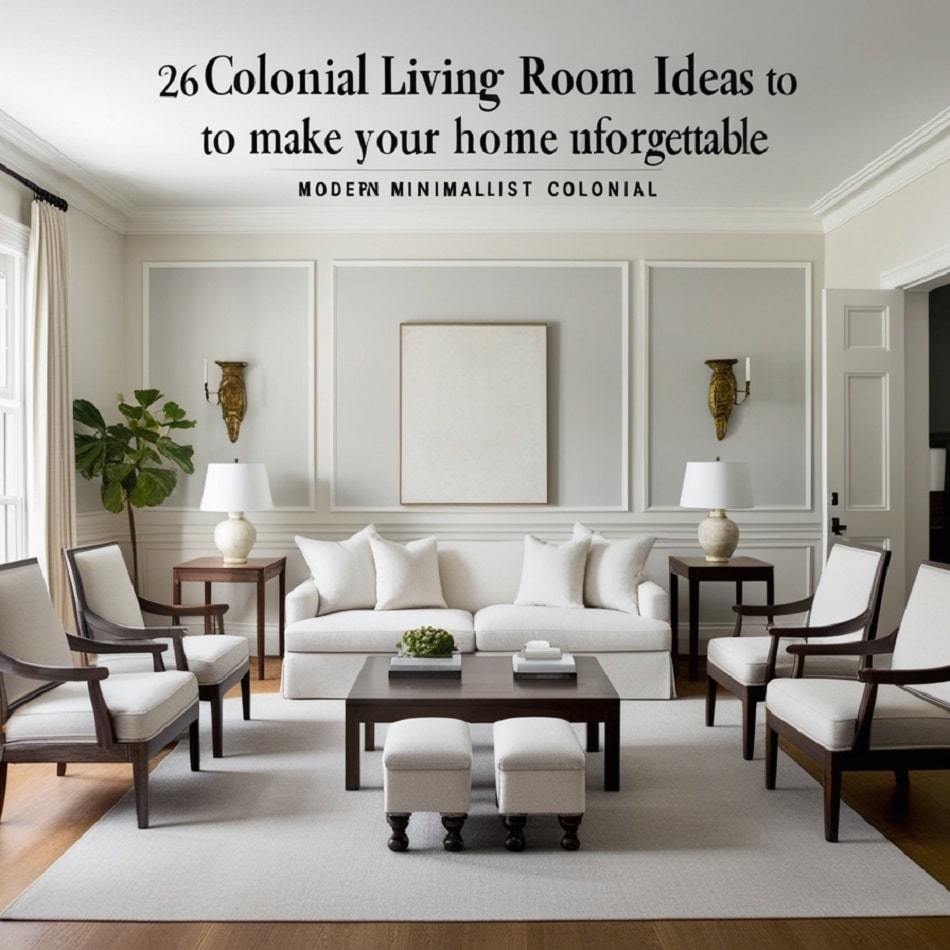
Design Characteristics
- Palette: Pure whites, soft grays, and pale beiges create a serene foundation.
- Furniture: Opt for functional, sleek pieces like Parsons tables and low-profile sofas.
- Decor: Use sparingly think antique brass candlesticks, unadorned curtains, and simple wall art.
Practical Tips
- Choose multipurpose furniture like storage ottomans or nesting tables to maximize utility.
- Keep decor understated; let natural light and clean lines define the space.
Why It Works: This pared-down approach highlights the craftsmanship and quality of every piece, allowing the Colonial aesthetic to shine through without feeling overwhelming.
5. Coastal Colonial
Bring the breezy, laid-back vibe of the seaside into your Colonial living room.
This design emphasizes light, airy spaces with nautical influences while maintaining the structure and elegance of Colonial interiors.
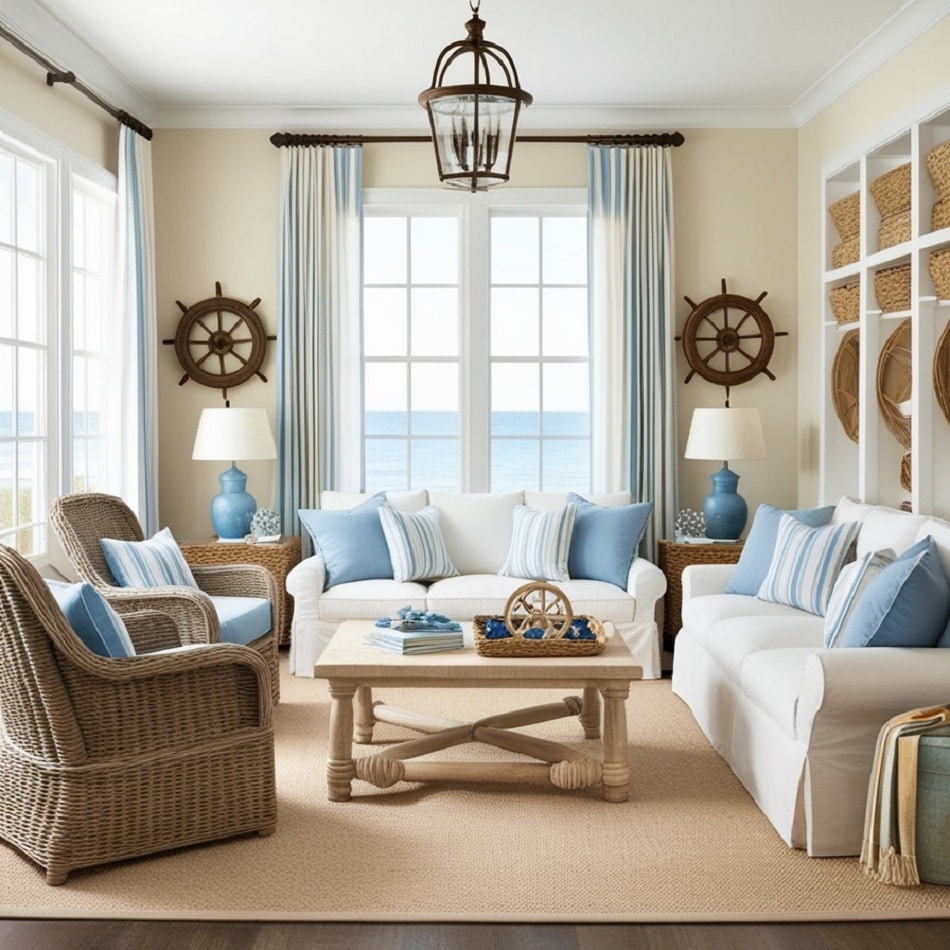
Key Features
- Color Palette: Soft blues, sandy beiges, and crisp whites evoke the coastline.
- Furniture: Wicker chairs, slipcovered sofas, and driftwood coffee tables add texture and charm.
- Decor: Incorporate nautical accents like ship wheels, striped fabrics, and sea glass vases.
Styling Tip: Use sheer curtains to allow natural light to flow freely, enhancing the coastal ambiance.
This relaxed interpretation of Colonial style is perfect for homes near the water or for those who want to recreate the tranquility of a beachside retreat.
6. Global Colonial Fusion
For a worldly twist, combine Colonial decor with influences from different cultures.
This style incorporates bold patterns, rich textures, and eclectic pieces, creating a truly unique and personalized space.
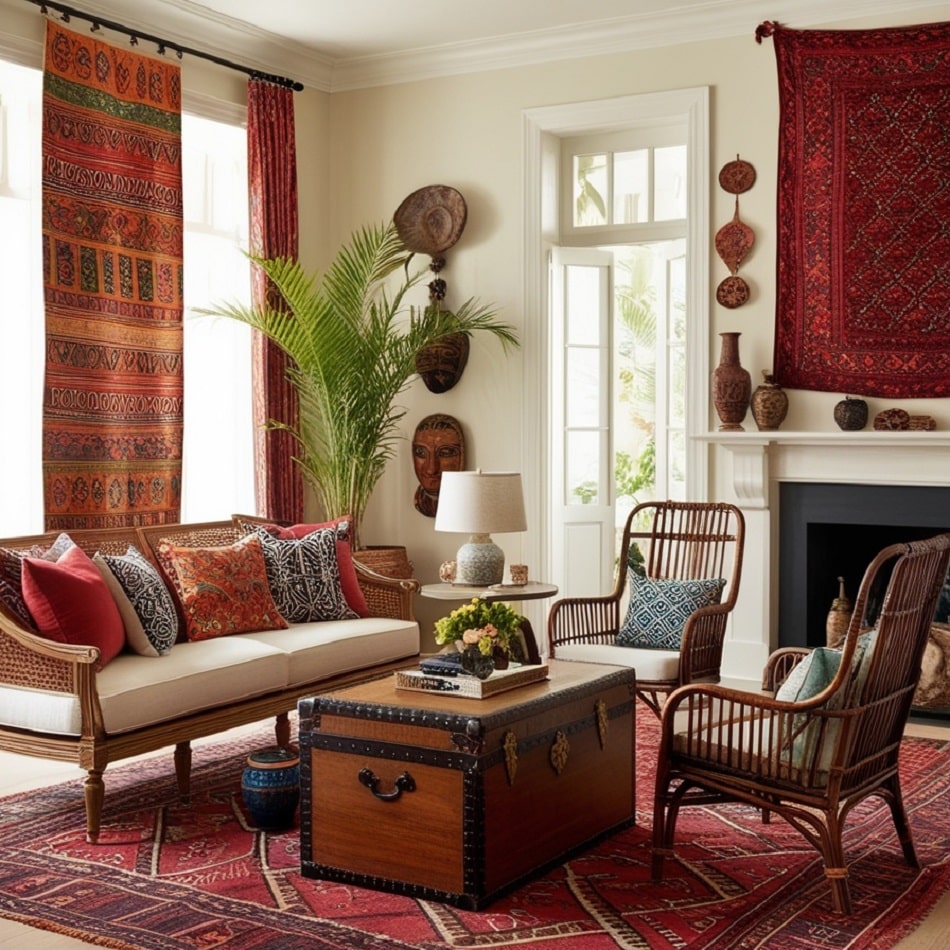
How to Nail the Look
- Textiles: Layer Moroccan rugs, Indian block-printed fabrics, or African mudcloth cushions.
- Furniture: Opt for carved wood pieces, antique trunks, and handwoven rattan chairs.
- Decor: Display global artifacts like masks, pottery, or tapestries alongside Colonial staples.
Styling Tips
- Choose a cohesive color palette to tie together diverse elements.
- Focus on quality over quantity when selecting global decor pieces to avoid a cluttered look.
Why It Works: This fusion interior style offers an opportunity to showcase your travels and heritage while staying grounded in Colonial elegance.
7. Victorian Colonial Living Room
Victorian Colonial design embraces opulence, ornate details, and a sense of grandeur, blending the ornate styling of the Victorian era with the balance and symmetry of Colonial decor.
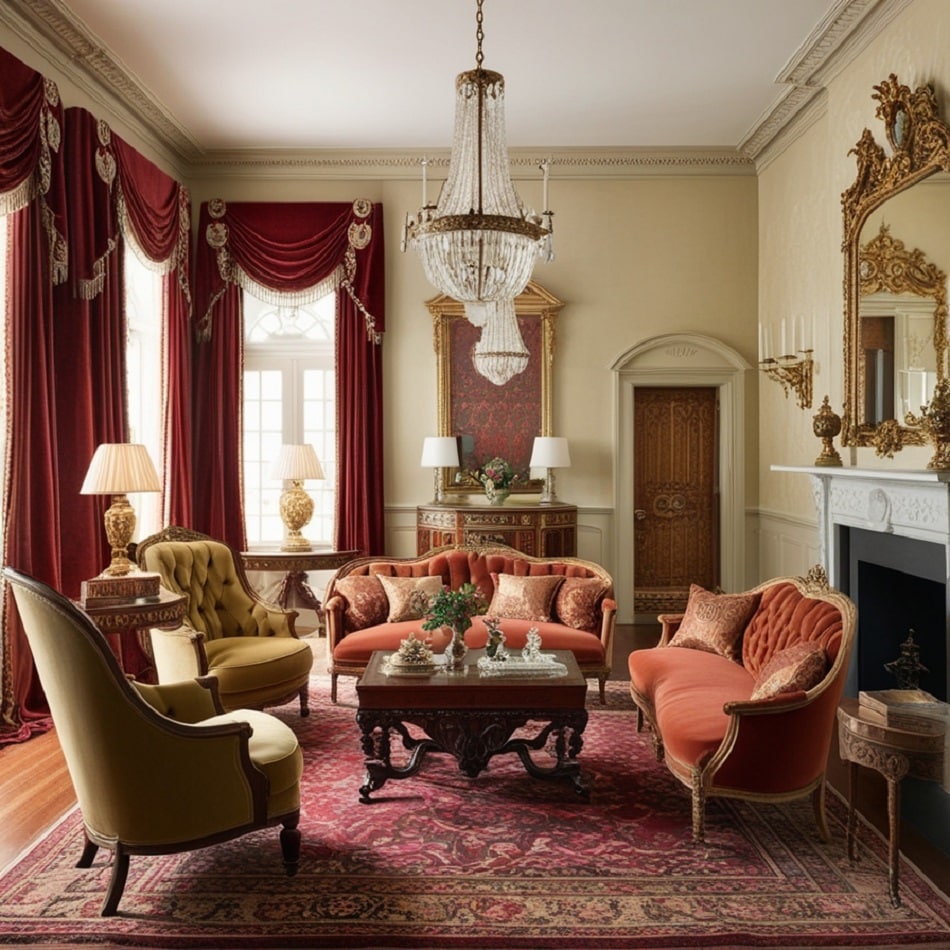
How to Style a Victorian Colonial Living Room
- Furniture: Invest in high-backed chairs, tufted settees, and intricately carved wooden tables.
- Textures: Use rich fabrics like velvet, brocade, and damask for curtains and upholstery.
- Decor: Add intricate wallpaper, crystal chandeliers, and gilded mirrors to enhance the space.
Styling Tips
- Use an antique color palette featuring deep reds, golds, and forest greens.
- Incorporate lush, patterned area rugs to add texture and warmth to hardwood floors.
Why It Works: Victorian Colonial combines luxurious materials and meticulous craftsmanship, offering a refined yet approachable aesthetic.
8. Industrial Colonial Vibe
The Industrial Colonial style merges rugged industrial elements with the warmth and tradition of Colonial design.
This style is perfect for those who love the raw charm of exposed materials and clean lines.
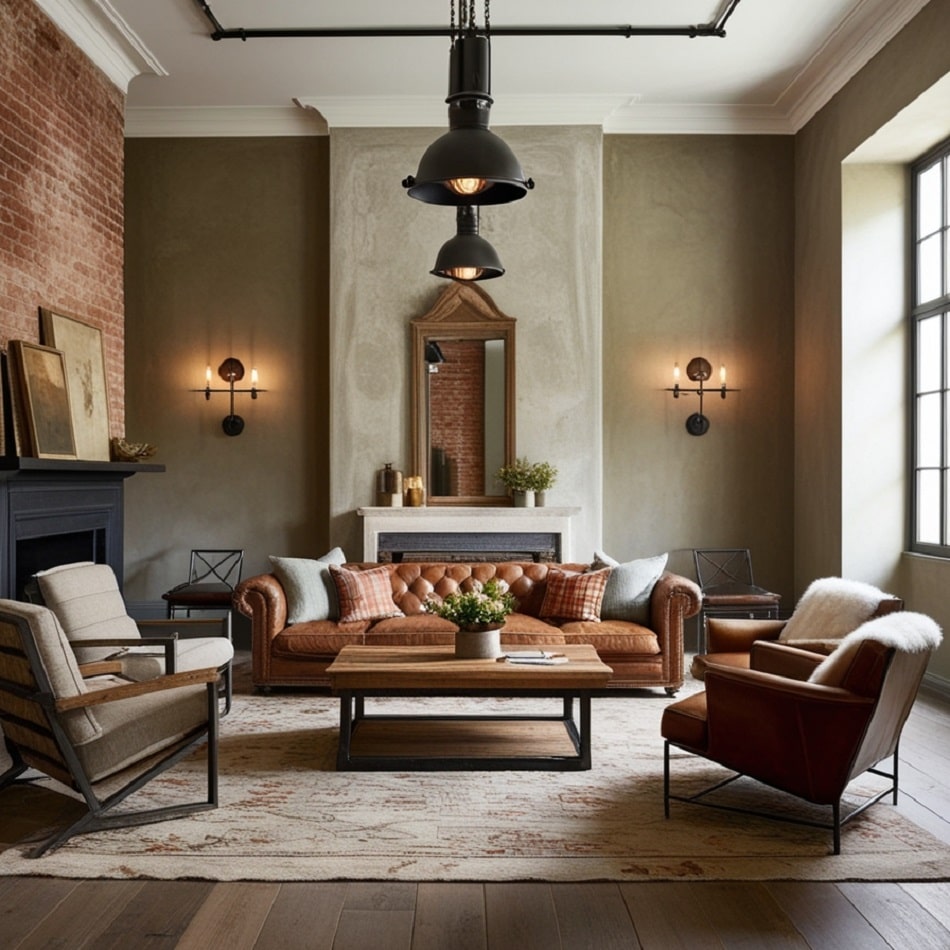
Design Elements
- Walls: Exposed brick or weathered plaster walls set a strong industrial tone.
- Furniture: Blend reclaimed wood furniture with metal-framed tables or chairs.
- Lighting: Industrial pendants with Edison bulbs or matte black sconces.
Pro Tip
Balance the industrial edge with cozy touches, like soft wool throws or tufted leather sofas.
Why It Stands Out: The juxtaposition of raw materials and Colonial refinement creates a visually compelling space with layers of depth.
9. Rustic Elegance in Colonial Living Rooms
If you prefer rustic charm with a polished twist, this style combines weathered materials and refined finishes for a cozy yet upscale look.
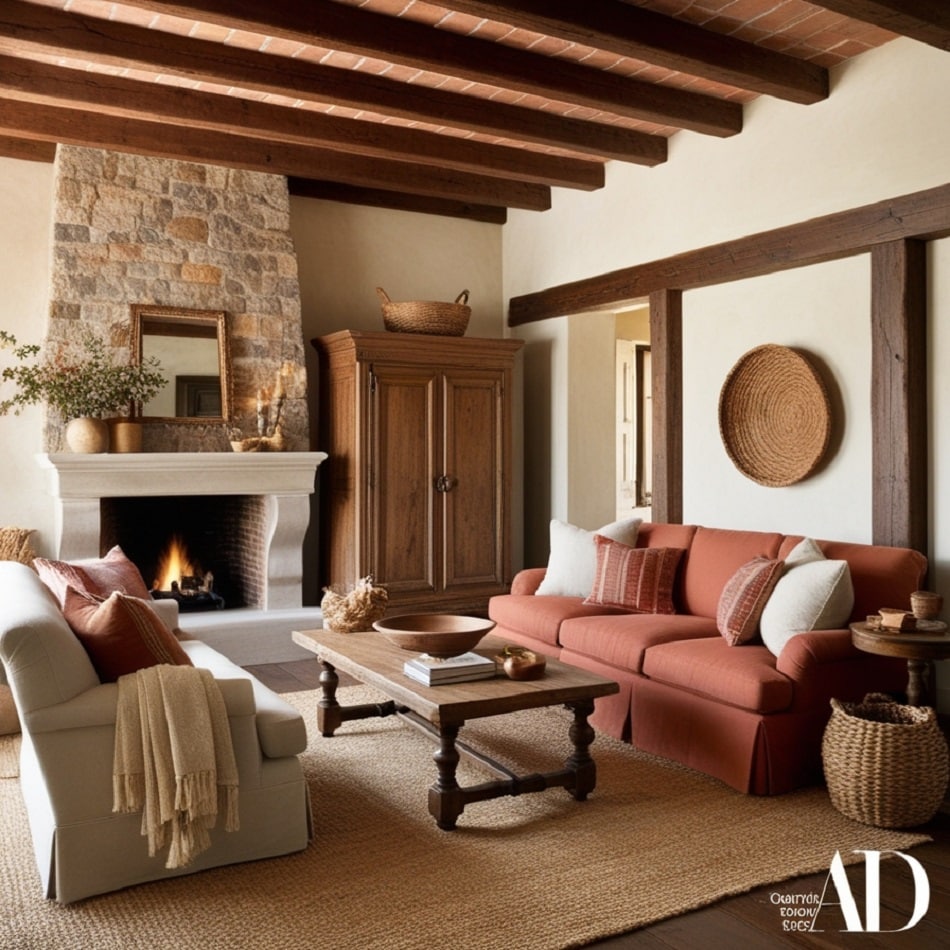
Core Features
- Materials: Incorporate stone fireplaces, reclaimed wood beams, and terracotta tiles.
- Furniture: Stick to wooden armoires, overstuffed sofas, and handmade tables.
- Decor: Use wool throws, pottery, and soft candlelight to add warmth.
Styling Tip
Focus on natural textures, like woven baskets or jute rugs, to complement the rugged aesthetic.
Why It Works: Rustic elegance emphasizes comfort while preserving the structured beauty of Colonial design.
10. Bohemian Colonial Fusion
For free-spirited souls, Bohemian Colonial merges eclectic, colorful Bohemian decor with the timeless charm of Colonial elements.
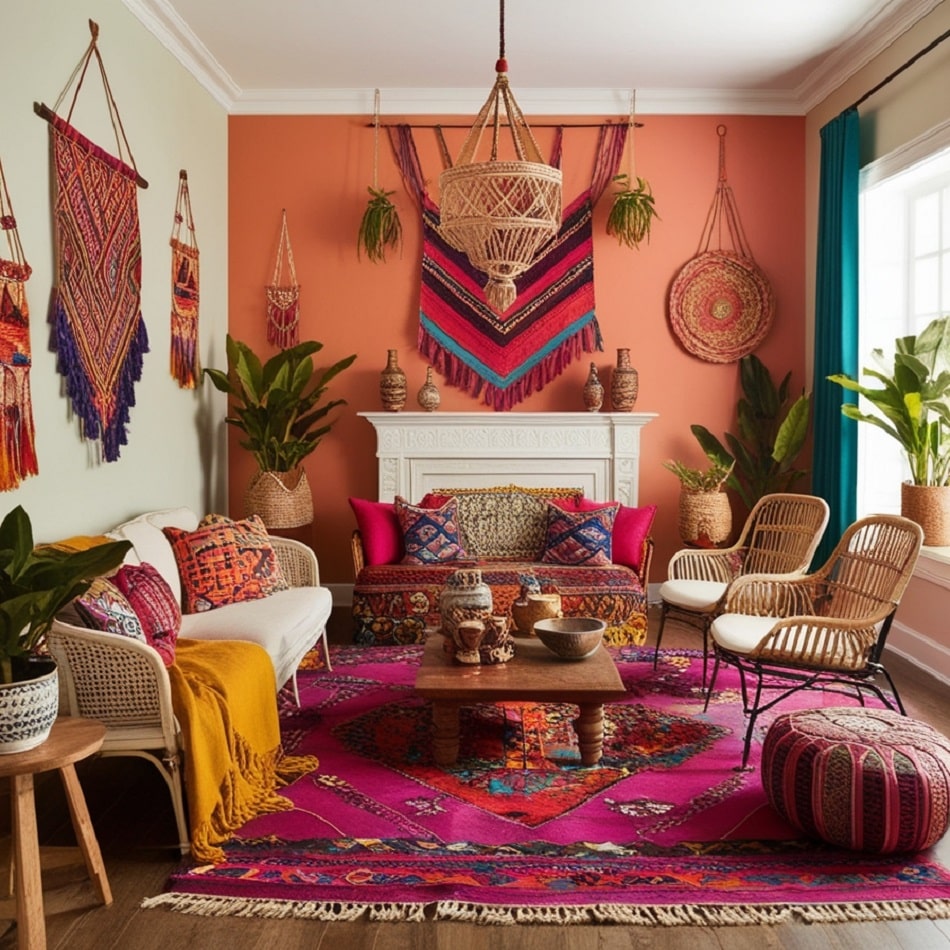
Key Elements
- Textiles: Layered patterns in bright hues, including macramé wall hangings and Moroccan poufs.
- Furniture: Mix and match vintage finds like wicker chairs and low wooden tables.
- Decor: Woven baskets, hanging plants, and bold area rugs create a rich, layered look.
Pro Tip
Balance bold Bohemian patterns with subdued Colonial-style furniture to keep the space cohesive.
Why It Works: This style allows for playful expression while still grounding the room in historic elegance.
11. Scandinavian Colonial Simplicity
This fusion blends the clean, light-filled look of Scandinavian design with Colonial architecture.
The result is serene and functional while maintaining a sense of tradition.
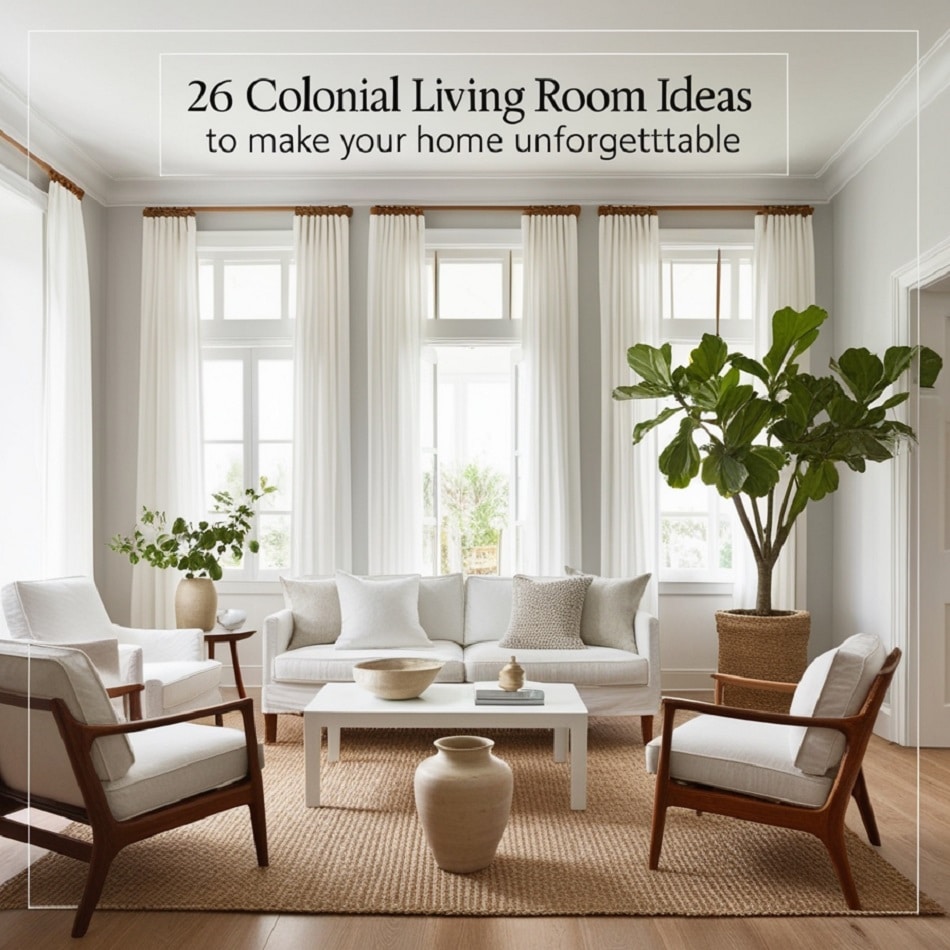
Features to Incorporate
- Color Palette: Whites, soft grays, and natural wood tones dominate.
- Furniture: Choose simple, clean-lined pieces like mid-century modern chairs and functional tables.
- Decor: Add wool throws, light wood finishes, and ceramic vases.
Styling Tips
- Use natural light strategically by adding sheer curtains or minimal window coverings.
- Focus on decluttering for an open, airy feel.
Why You’ll Love It: This style is perfect for smaller spaces, creating a calming, uncluttered atmosphere.
12. Mediterranean Colonial Warmth
Drawing inspiration from sun-soaked coasts, Mediterranean Colonial features warm tones, natural materials, and an emphasis on indoor-outdoor living.
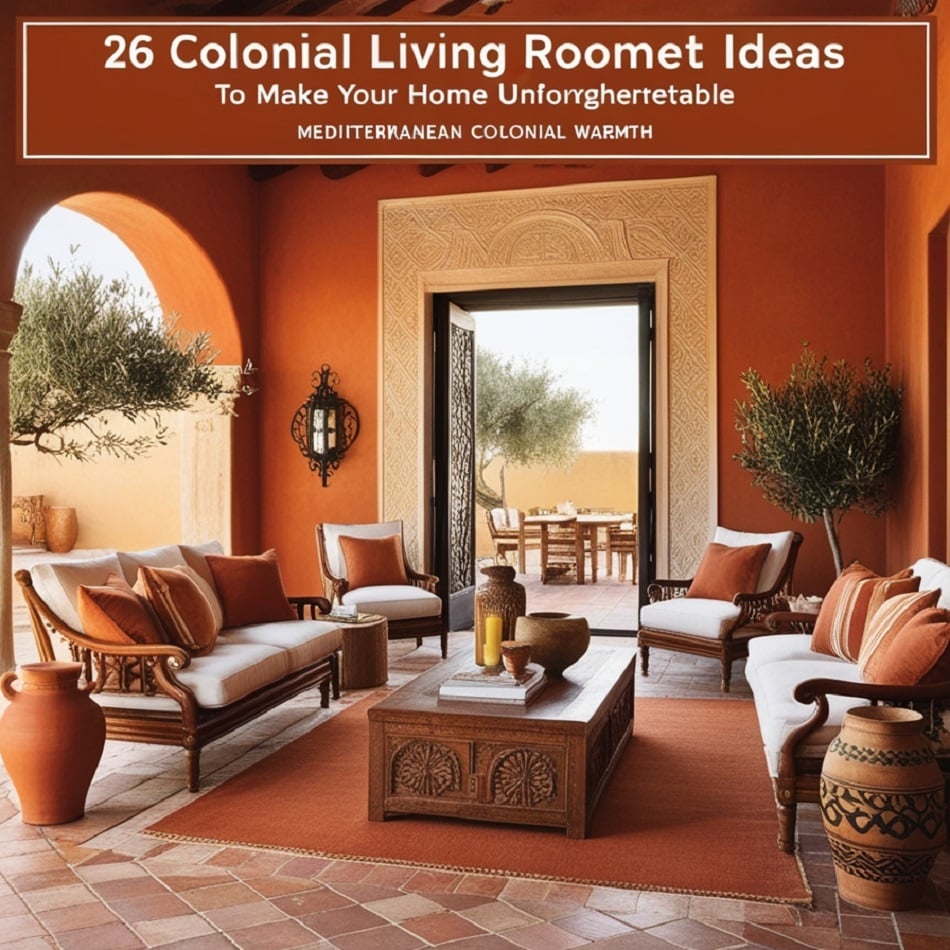
How to Achieve the Look
- Colors: Terracotta, warm whites, and ochre tones dominate the palette.
- Furniture: Choose hand-carved wooden pieces with intricate designs.
- Decor: Add textured stucco walls, wrought iron accents, and greenery like olive trees.
Pro Tip
Tile floors with area rugs bring an authentic Mediterranean touch while staying true to Colonial roots.
Why It Works: The inviting warmth of Mediterranean styling complements Colonial structure beautifully, creating a cozy, sunlit space.
13. Zen Colonial Living Room
Achieve harmony and peace with Zen Colonial, a minimalist style that focuses on balance and natural beauty.
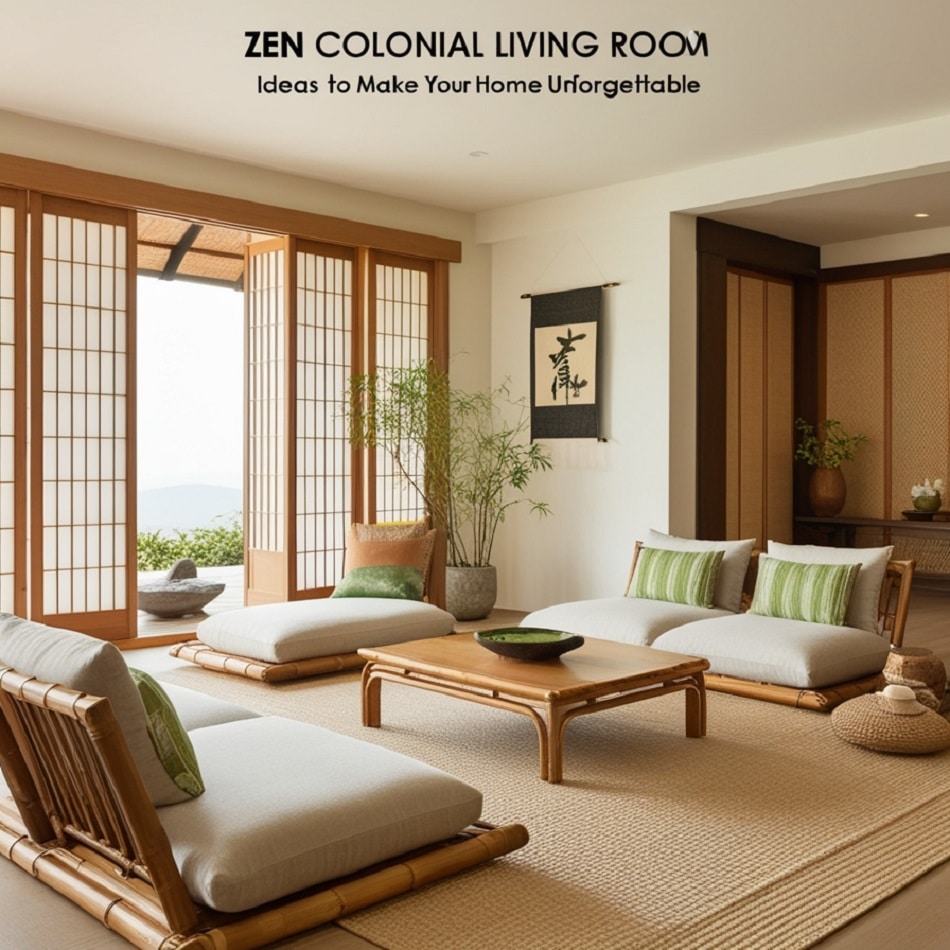
Elements of Zen Colonial
- Materials: Use bamboo, light woods, and organic fabrics.
- Furniture: Low seating, like floor cushions or platform sofas, keeps the room grounded.
- Decor: Add water features, bonsai plants, or minimal Japanese-style art.
Practical Tips
- Use sliding shoji screens to create flexible spaces.
- Incorporate soft, indirect lighting for a calming atmosphere.
Why You’ll Love It: This style promotes relaxation and mindfulness, creating a perfect retreat within your home.
14. Cottage Colonial Charm
Channel the cozy appeal of a countryside cottage with a Cottage Colonial living room.
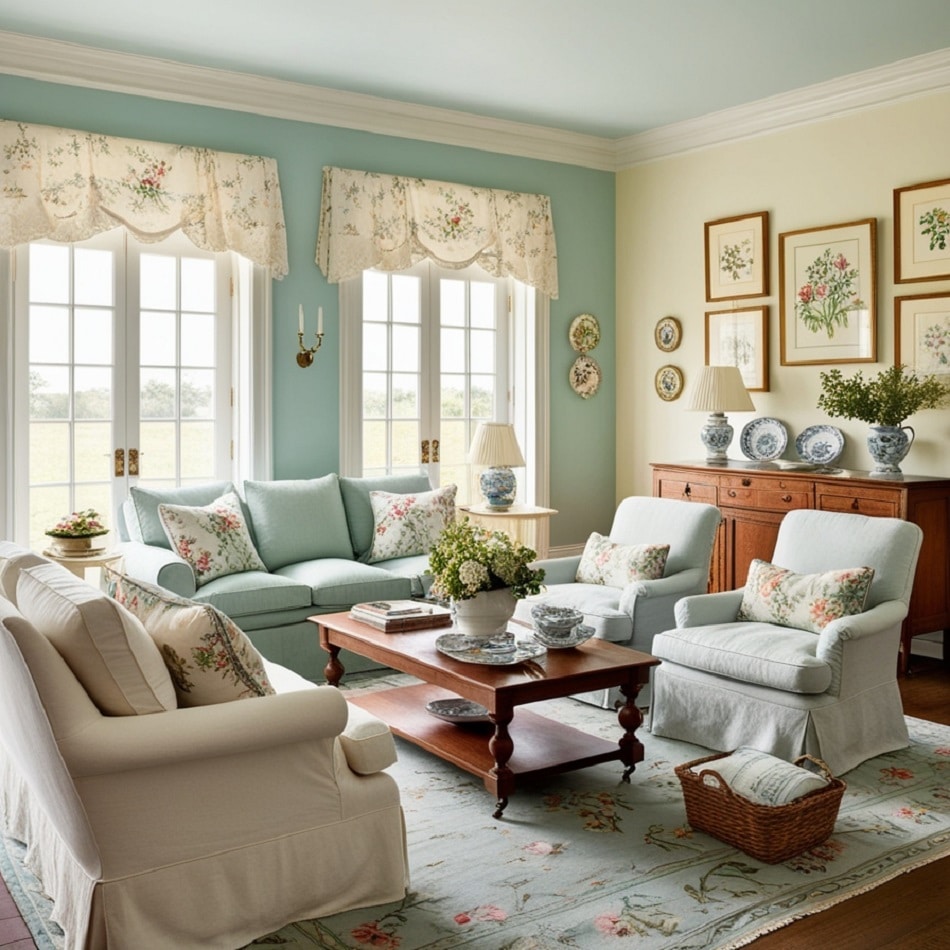
Design Details
- Colors: Pastel palettes featuring soft blues, greens, and creams.
- Furniture: Overstuffed chairs, slipcovered sofas, and wooden sideboards.
- Decor: Incorporate floral fabrics, botanical prints, and lace curtains.
Quick Tip: Use vintage accessories like tea sets or embroidered pillows for added charm.
Why It Works: The combination of Colonial structure and cottage coziness creates a welcoming, family-friendly space.
15. Minimalist Colonial Elegance
For lovers of clean lines and uncluttered spaces, Minimalist Colonial emphasizes simplicity while maintaining the classic elegance of Colonial style.
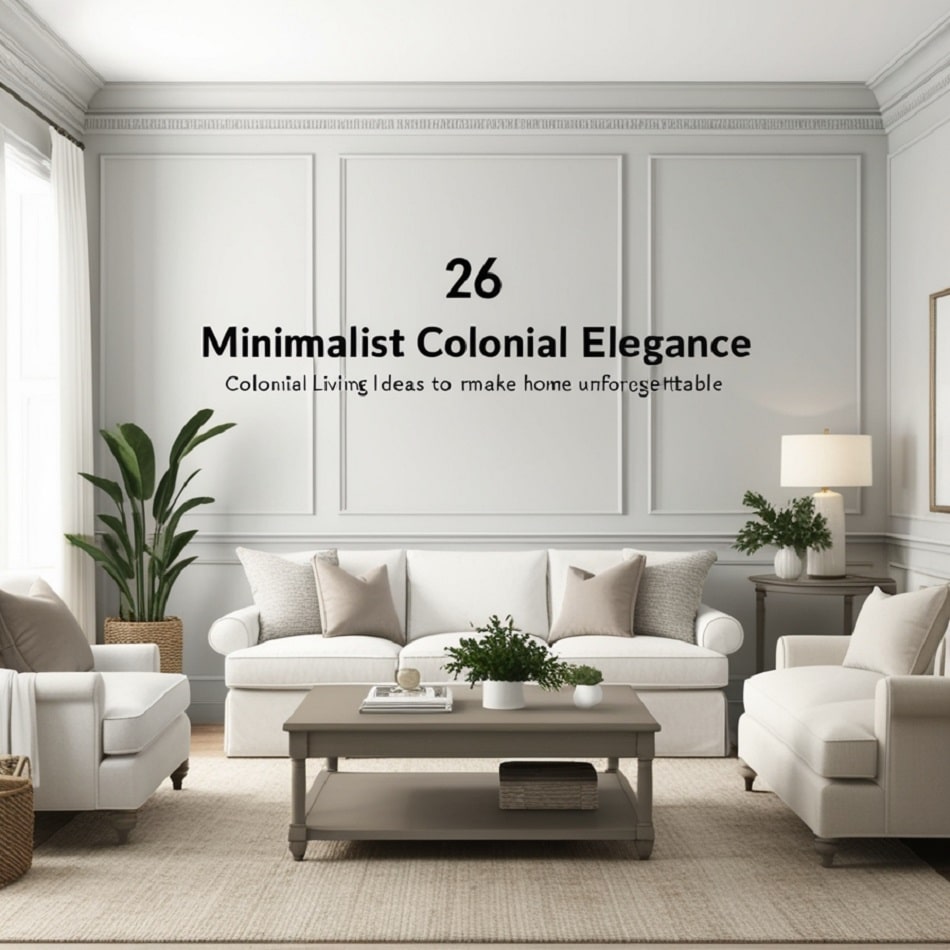
Key Features
- Color Palette: Stick to whites, light grays, and muted earth tones for a serene atmosphere.
- Furniture: Focus on functional yet stylish pieces, like a streamlined wooden coffee table or a neutral-toned sofa.
- Decor: Keep decorations minimal, using a single statement artwork or a vase of fresh greenery.
Styling Tips
- Avoid clutter by choosing dual-purpose furniture like storage ottomans or built-in shelving.
- Let architectural elements, like crown moldings, shine without overwhelming decor.
Why It Works: Minimalism brings a fresh, modern twist to Colonial design, ideal for a tranquil yet timeless living space.
16. Contemporary Colonial Sophistication
Contemporary Colonial merges modern design principles with the classic structure of Colonial interiors, creating a harmonious balance.
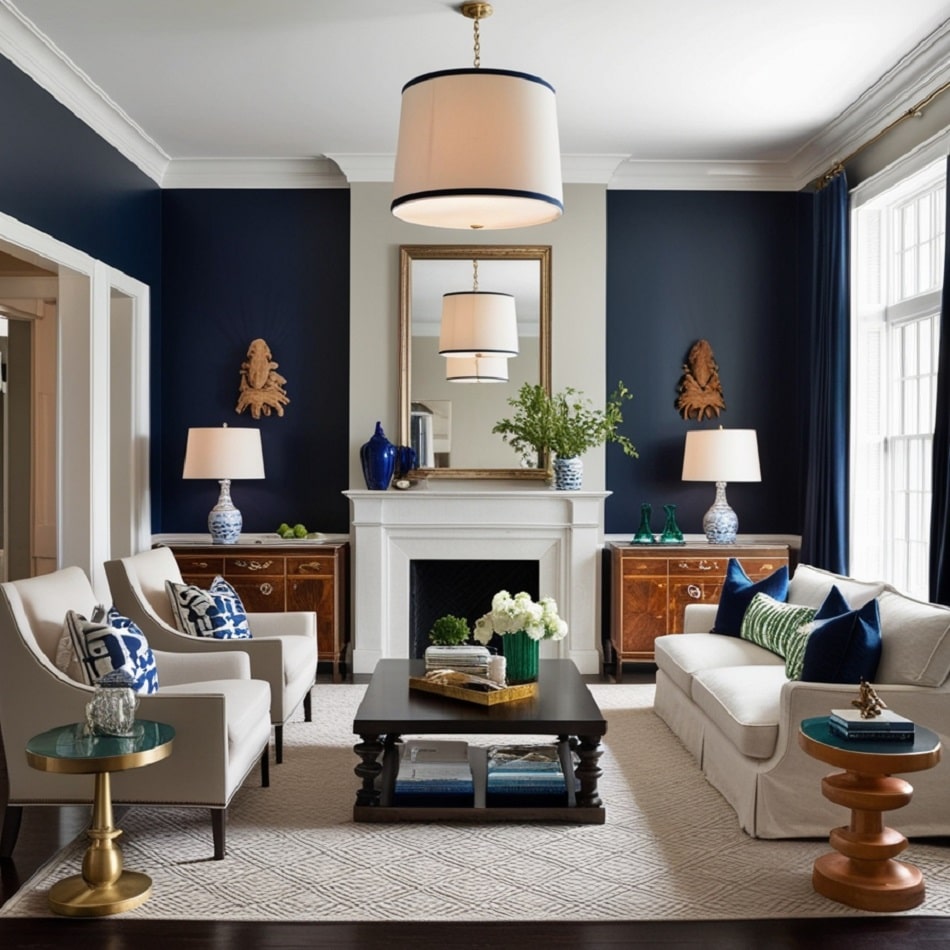
Elements to Include
- Furniture: Incorporate sleek, modern sofas alongside traditional Colonial side tables.
- Colors: Combine bold accent colors like navy or emerald with a neutral base.
- Lighting: Use statement lighting, such as oversized pendant lamps or artistic sconces.
Pro Tip
Mix antique Colonial artifacts with modern decor to create a layered, sophisticated space.
Why You’ll Love It: This style caters to those seeking a polished, up-to-date look while honoring historical charm.
17. Vintage Colonial Appeal
Transport your living room back in time with Vintage Colonial, emphasizing nostalgia and old-world charm.
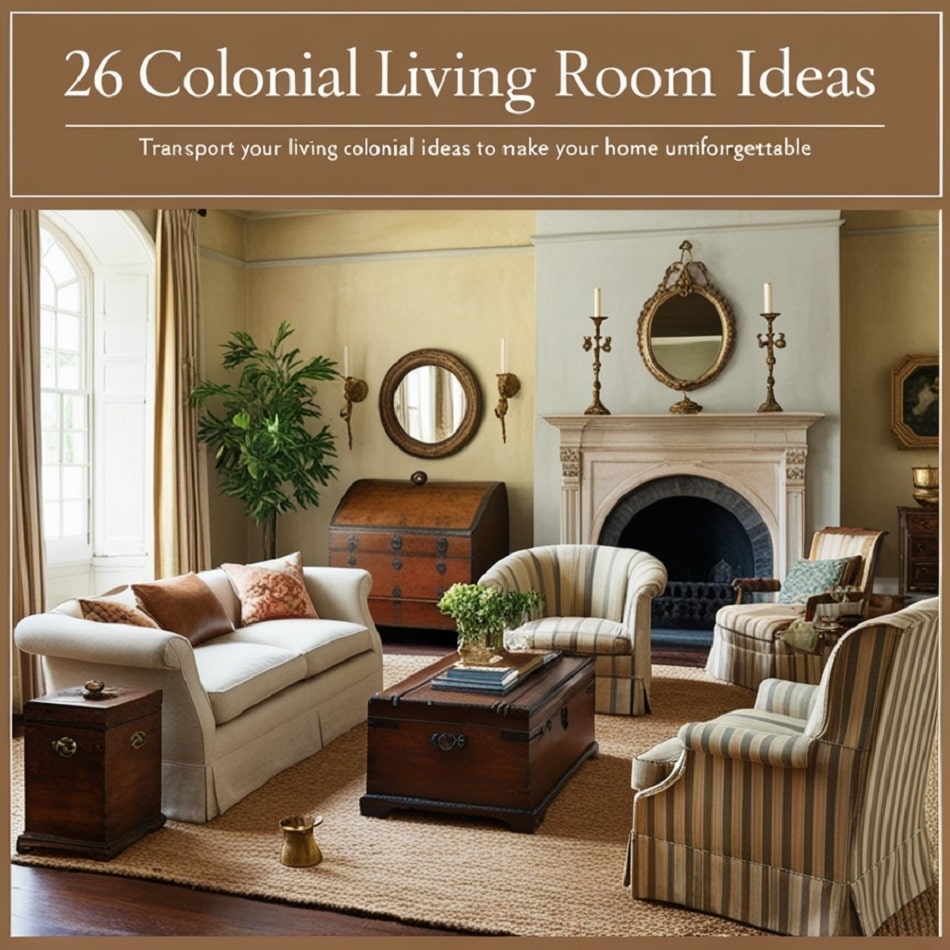
Design Features
- Furniture: Include vintage wooden chests, roll-arm sofas, and wingback chairs.
- Accessories: Use antique mirrors, oil paintings, and brass candlesticks for authentic touches.
- Textiles: Incorporate striped patterns and aged leather for an effortlessly vintage look.
Styling Tip
Look for genuine antiques or high-quality reproductions to maintain authenticity.
Why It Works: Vintage Colonial pays homage to history, creating a space filled with character and warmth.
18. Eco-Colonial
Eco-Colonial combines timeless Colonial living room elegance with sustainability. This style highlights reclaimed wood furniture, natural fiber textiles, and upcycled decor, ensuring an eco-friendly design.
Incorporate earthy tones like olive green, terracotta, and beige, paired with low-VOC paints for a healthier home. Add potted plants to improve air quality and maximize natural light with airy curtains.
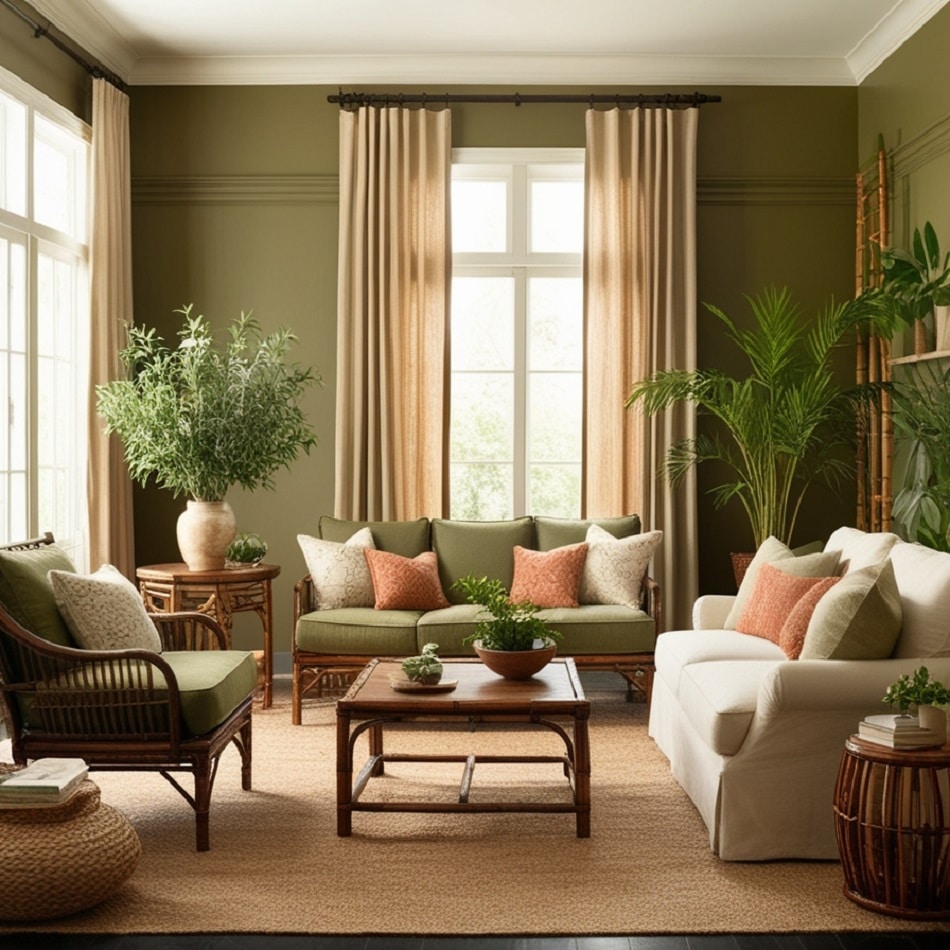
Decorate with bamboo or rattan elements and antique furniture for authenticity. Eco-Colonial balances sophistication and environmental consciousness for a truly mindful living space.
19. Retro Colonial Charm
For a playful take on classic design, Retro Colonial incorporates vibrant mid-century influences into a Colonial backdrop.
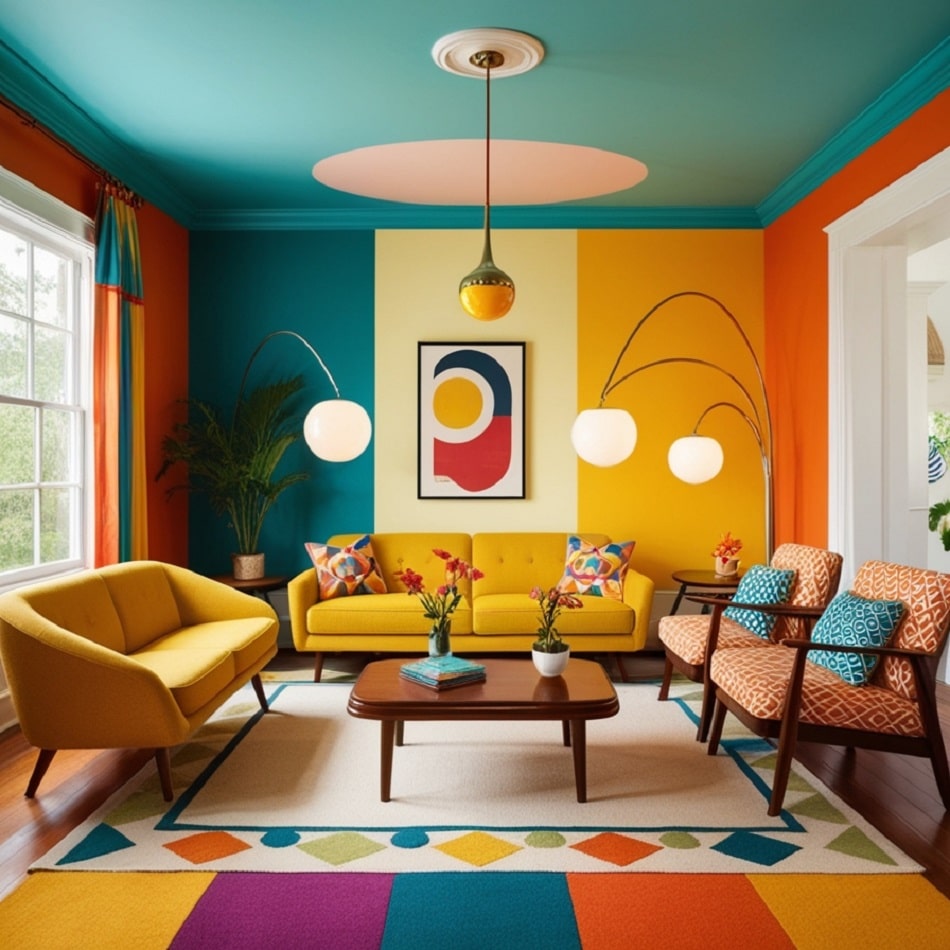
Core Features
- Furniture: Use bold, mid-century modern sofas alongside Colonial-style coffee tables.
- Colors: Opt for cheerful hues like mustard yellow, teal, or burnt orange.
- Decor: Add retro lighting, such as arc floor lamps or bubble chandeliers.
Styling Tips
- Balance bold retro elements with classic Colonial designs for visual harmony.
- Consider using geometric patterns on throw pillows or rugs.
Why It Stands Out: Retro Colonial feels fun and energetic, ideal for homeowners who love color and character.
20. Urban Colonial Living Room
For city dwellers, Urban Colonial is a perfect blend of modern metropolitan vibes with classic Colonial warmth.
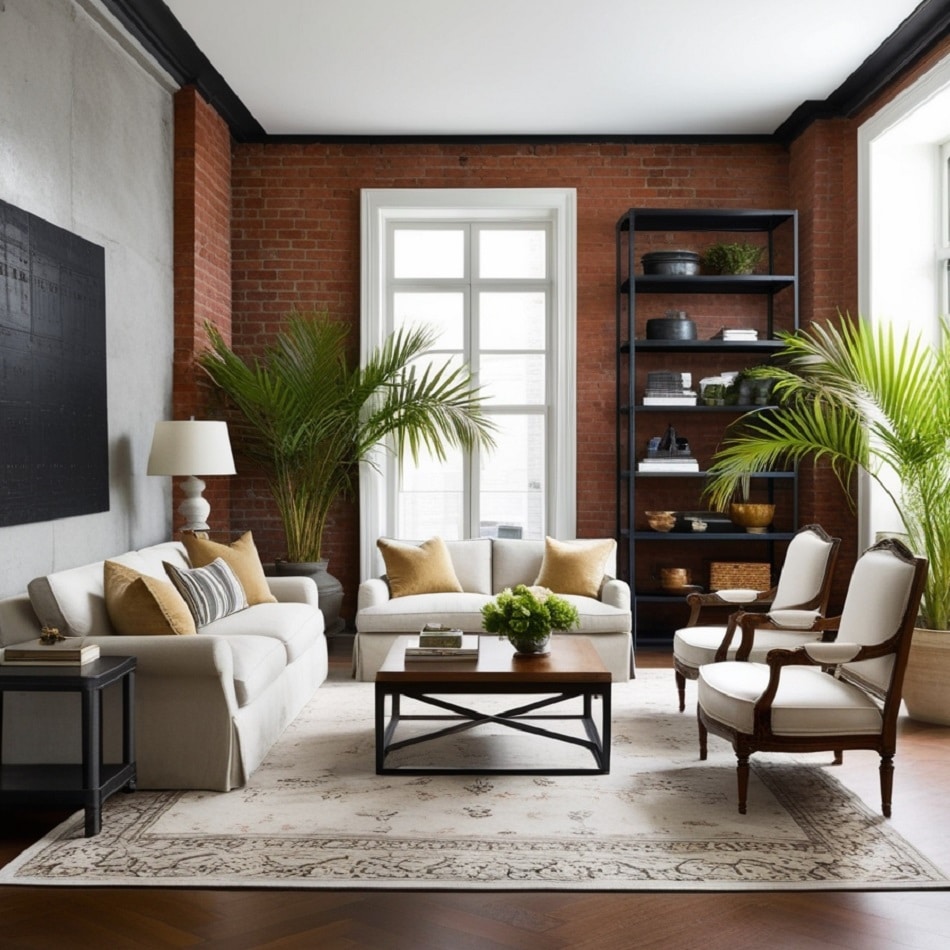
Design Features
- Walls: Use exposed brick or painted concrete for an urban feel.
- Furniture: Blend sleek modern sofas with antique Colonial armchairs.
- Decor: Add industrial accents like black metal shelving or oversized artwork.
Pro Tip
Include greenery, like potted palms, to soften the industrial edge of urban decor.
Why It Works: Urban Colonial offers a contemporary yet grounded aesthetic, perfect for modern apartments or townhouses.
21. Eclectic Colonial Vibe
Eclectic Colonial combines a variety of styles, patterns, and textures into a cohesive, personalized space.
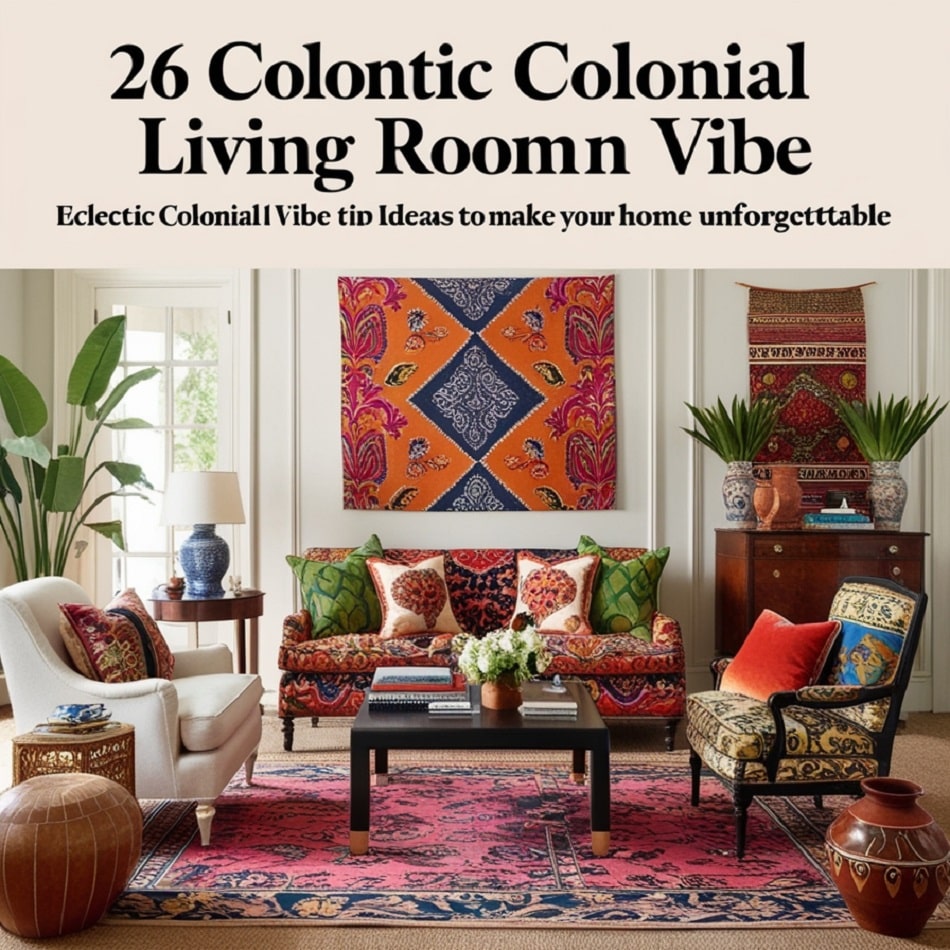
How to Pull It Off
- Furniture: Mix furniture from different eras, such as a modern coffee table with antique chairs.
- Patterns: Layer bold designs like ikat, paisley, or florals.
- Decor: Use mismatched accessories, like pottery, books, and global textiles.
Styling Tip
Stick to a unifying color palette to avoid visual clutter.
Why You’ll Love It: Eclectic Colonial reflects individuality and creativity, ensuring no two living rooms look alike.
22. Zen Colonial Serenity
For those craving peace and simplicity, Zen Colonial combines minimalism with natural materials for a tranquil space.
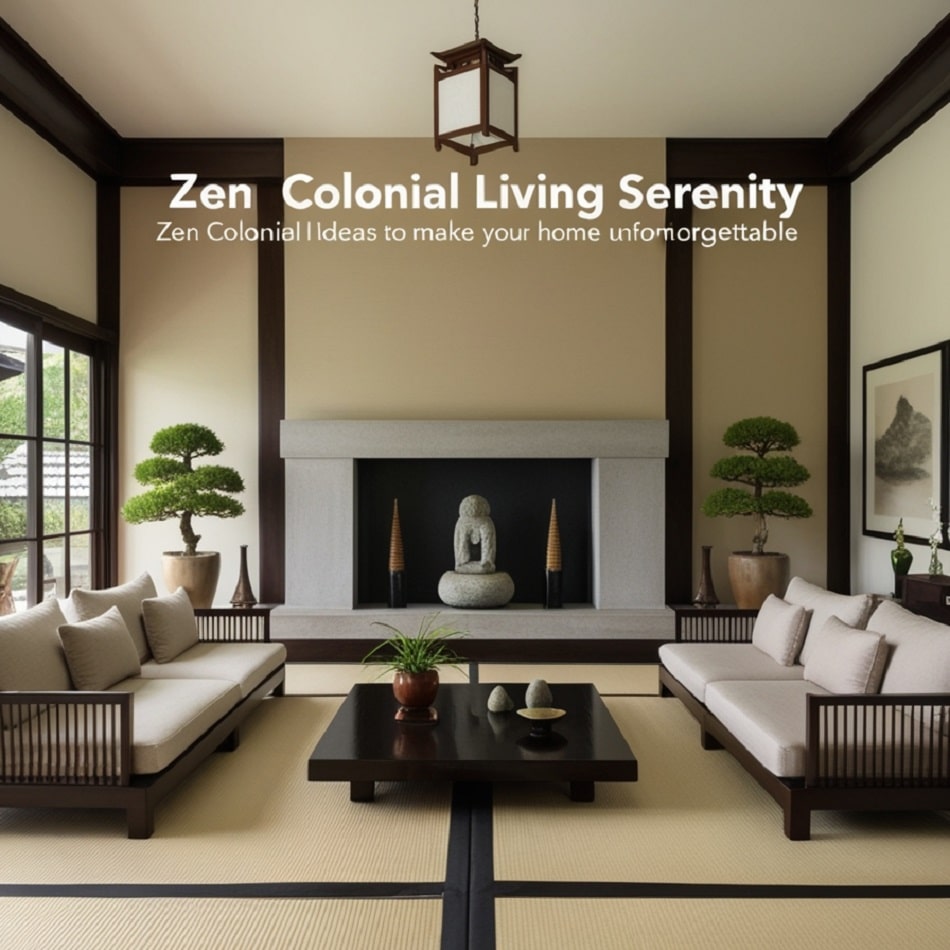
Features to Incorporate
- Furniture: Low-profile sofas and tatami mats bring a grounded feel.
- Decor: Include water features, bonsai trees, and natural stone sculptures.
- Colors: Stick to soft earth tones like beige, taupe, and moss green.
Practical Tips
- Avoid clutter and stick to a “less is more” philosophy.
- Use ambient lighting for a calming effect.
Why It Stands Out: Zen Colonial creates a perfect retreat from the chaos of daily life.
23. Cottage Colonial Comfort
Cottage Colonial embraces cozy, quaint aesthetics while maintaining the elegance of Colonial architecture.
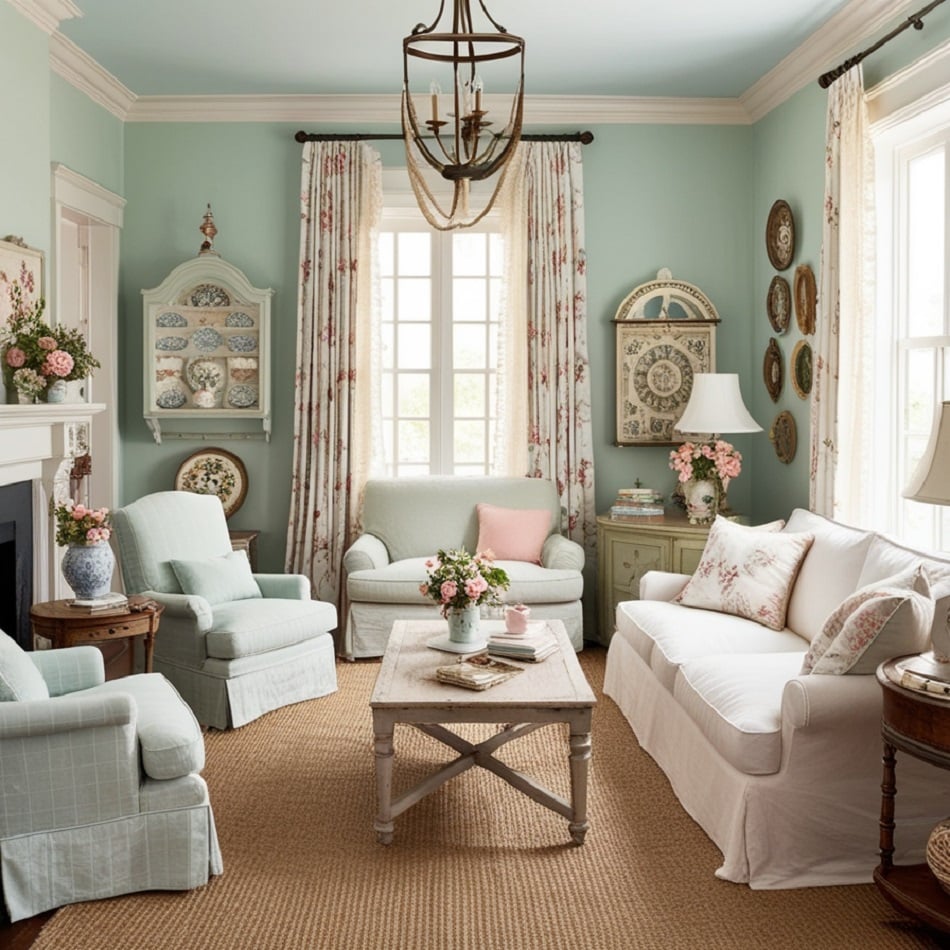
Key Elements
- Furniture: Look for upholstered armchairs, slipcovered sofas, and distressed wooden tables.
- Colors: Soft pastels like mint, blush, and sky blue dominate the palette.
- Decor: Use floral patterns, botanical prints, and vintage-inspired accessories.
Styling Tips
- Add layered curtains or lace drapes to enhance the charm.
- Incorporate heirloom pieces, like antique clocks or china displays, to add character.
Why It Works: Cottage Colonial offers an inviting and warm environment, perfect for family gatherings.
24. Glamorous Colonial Sophistication
For those who appreciate a luxurious touch, Glamorous Colonial incorporates opulent details without losing its traditional roots.
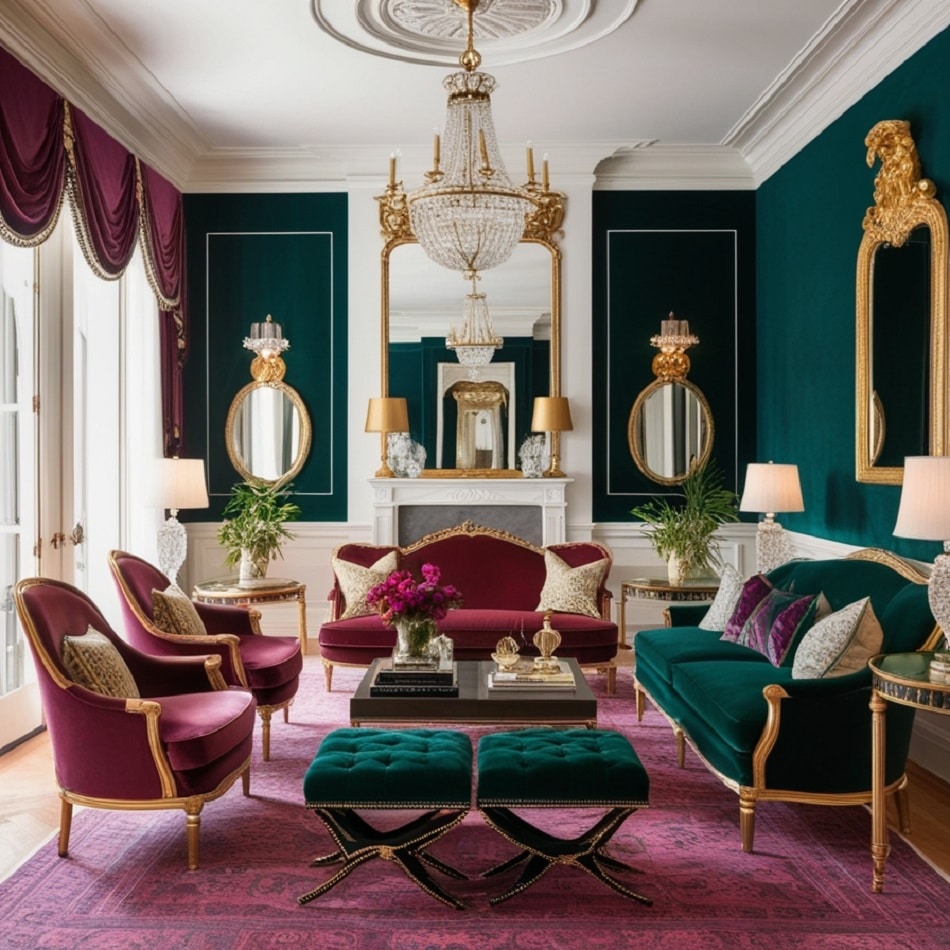
Design Features
- Materials: Use velvet upholstery, gold-leaf mirrors, and polished wood.
- Lighting: Crystal chandeliers or gilded sconces add grandeur.
- Colors: Deep jewel tones like emerald, sapphire, and amethyst elevate the aesthetic.
Pro Tip
Include ornate moldings and ceiling medallions for an authentic Colonial luxury vibe.
Why It Shines: Glamorous Colonial merges timeless design with upscale sophistication, creating a show-stopping space.
25. Rustic Elegance with Colonial Roots
Rustic Elegance emphasizes natural materials and a lived-in charm while honoring Colonial design elements.
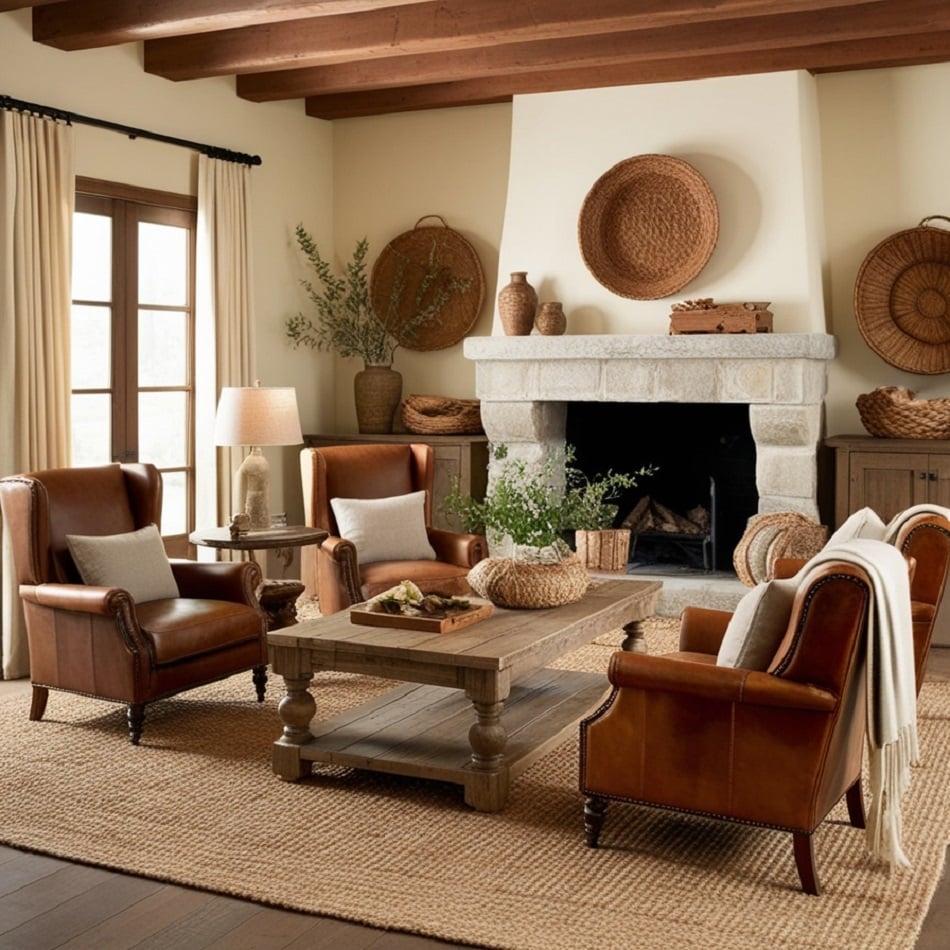
Core Features
- Furniture: Use distressed wood coffee tables and leather armchairs for a rugged look.
- Decor: Add woven baskets, wool throws, and hand-carved accents.
- Color Palette: Choose earthy tones like terracotta, olive green, and cream.
Styling Tip
Incorporate a stone fireplace or exposed wooden beams to enhance the rustic appeal.
Why You’ll Love It: Rustic Elegance offers a cozy yet refined living space that feels both warm and timeless.
26. Artistic Colonial Flair
Bring creativity into your home with Artistic Colonial, a style that showcases unique, handcrafted decor and artistic elements.
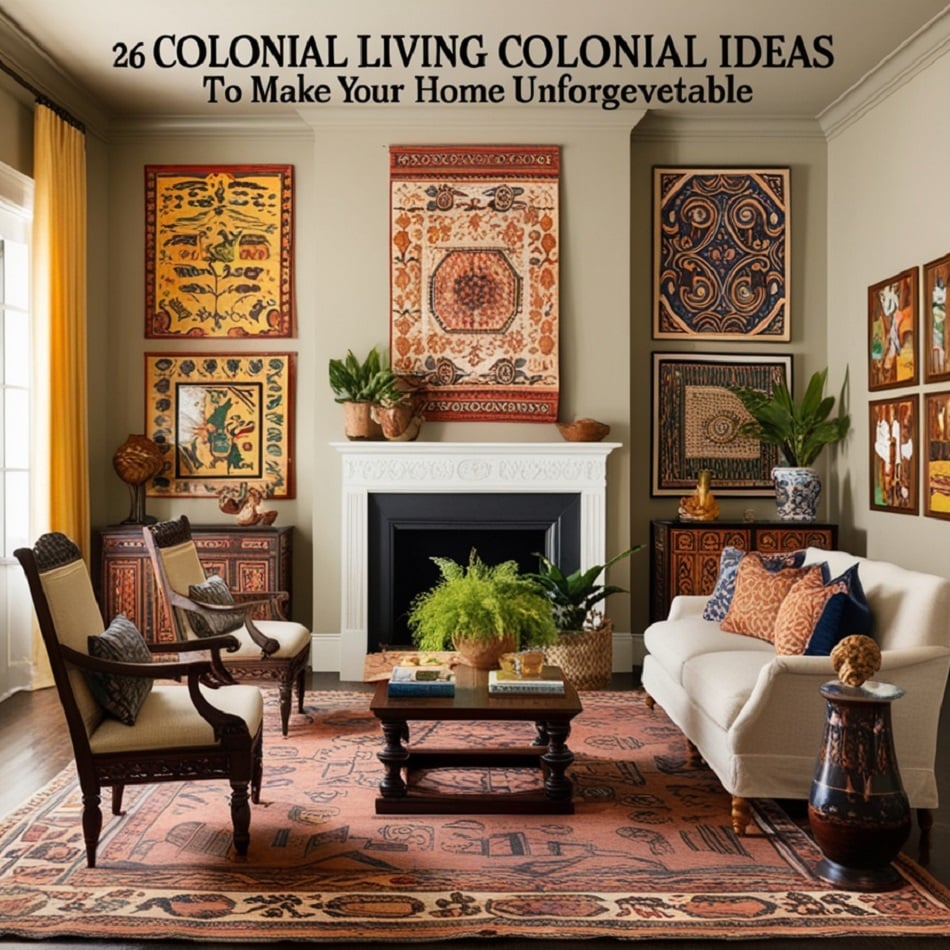
Key Design Elements
- Furniture: Opt for custom-made pieces, like carved wooden chairs or hand-painted cabinets.
- Decor: Use artistic patterns on rugs, bold wallpapers, and gallery-style wall art.
- Materials: Incorporate dark woods, textured fabrics, and ceramics.
Pro Tips
- Support local artisans by sourcing handmade decor.
- Highlight one-of-a-kind items, like a sculpture or painted tile mural, as focal points.
Why It Works: Artistic Colonial adds personality and creativity, making your living room a true reflection of your taste.
Key Tips for Styling a Colonial Living Room
To bring any of these styles to life, consider the following practical tips:
- Layer Textures: Combine fabrics like wool, velvet, and linen for depth and coziness.
- Focus on Balance: Mix bold statement pieces with subtle decor for harmony.
- Lighting Matters: Use warm lighting, such as lamps or chandeliers, to create ambiance.
- Sustainability: Opt for reclaimed wood, eco-friendly paints, and natural textiles.
Final Thoughts
Creating a Colonial living room is about honoring timeless design while adapting it to modern tastes.
Whether you prefer Rustic Charm, Minimalism, or Eclectic Decor, there’s a Colonial style that fits your vision.
By mixing elements like neutral color palettes, antique accessories, and sustainable materials, you can design a space that feels both historical and contemporary.
Whatever your choice, these ideas ensure your living room becomes a statement of elegance and comfort.

George Martin is a home décor expert and the creative mind behind Home Pedos. With years of experience in transforming spaces, George shares the latest trends, innovative ideas, and practical tips to help you create a home you love. His passion for design is evident in every article, making home styling both accessible and inspiring.